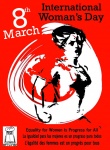The effects of the pandemic on education
Please accept my warm greeting
It is important for us to keep in touch even through video conferencing.
I want to wish to the WFTU and all of you strength, solidarity, fighting spirit and to always move forward with the flag of the working class, with the flag of the WFTU and FISE.
As in the rest of the world, so in Europe, the pandemic is sweeping human lives, dismantling labor rights and valuable goods such as health and education.
European governments are taking advantage of the pandemic and have already imposed tougher measures on all of us. They have generalized distance work, flexible forms of employment, quarterly contracts, wage cuts, dismissals. The problems are similar to what was heard. There are schools which are closed, the teachers and the cleaning staff are not enough. There are huge shortages, there is also a risk of the virus spreading, since the number of pupils in each class remains the same, as before the pandemic. Protective measures are incomplete and governments are talking about individual responsibility. Teleworking has become widespread in universities and in many schools, with the result to exclude the students who are poor, refugees, migrants, disabled and all the vulnerable groups. Discrimination in education is multiplying.
The Greek government refuses to spend money on measures to protect teachers and students, but gives 2 million euros to the Mass Media for … a campaign against the spread of the coronavirus! It is also giving 4 billion euros to buy 18 “Rafale” fighter jets which are 4th generation. It exempts large business groups from taxation of millions of euros and gives 600 million euros as financial support to the tourism sector for the development of “green” hotels.
In Greece the workers, teachers, students together with their parents, broke the bans on protests and demonstrations, broke the terrorism and the fascist threats of the government and under the slogan “the mask is not the only protection, give money for education” they demand funding, protection measures, educational and support staff.
In Italy, a successful teachers’ strike took place on September 24 and 25 and the protests continue. Problems generally exist throughout Europe but the European Confederation of Educational Organizations (ETUCE), a member of the International Education (IE), plays the role of a breakwater and thus they drown the indignation of teachers and students through loose announcements that express concern, they call for the sensitivity of governments to solve problems and urges the trade unions to prepare for the upcoming meeting of education ministers in Rome.
On September 3, 2020, the UN High Commissioner for Refugees (UNHCR) published a report entitled “Coming Together for Refugee Education”, which provides that if the international community does not take immediate and bold action to stem the devastating effects of COVID-19 on refugee education, the prospects of millions of young refugees who live in the world’s most vulnerable communities are being further threatened. The data of the report are based on the gross enrollment data in the schools that emerged from the school year 2019.
Prior to the pandemic, a refugee child was twice as likely to be out of school as a non-refugee child. This situation is going to get worse – many children may not be able to start school again because many schools are closing, due to financial difficulties to cover tuition fees, uniforms or books, due to the lack of access to technological means or because they are forced to work in order to support their family.
“Half of the world’s refugee children were already out of school,” said Filippo Grandi, the UN High Commissioner for Refugees.
The 2019 figures presented in the report are based on reports from twelve countries, which host more than half of the world’s refugee children. Although the gross enrollment rate in primary school reaches 77%, only 31% of young people enroll in secondary education. Only 3% of young refugees enroll in higher education, while refugee girls have less access to education. The report emphasizes that these rates are dangerously worsening with the pandemic and it closes with a call to the governments, the private sector, civil society and other key actors to join forces to find solutions that strengthen national education systems, lead to certified education while securing and safeguard financial resources for education.
Instead of commenting, I prefer to recite Brecht’s verse “those who stole our book from us, accuse us of being unreadable” and to close by saying that in order to be able to expose the thieves and violators of our rights, we need the strengthening of FISE, the strengthening of the WFTU.
Strengthening of solidarity, cooperation, mutual information about our actions.
This is the better way for us to honor the World Teachers’ Day and the day of action of FISE and the WFTU.
Crisoula Lampoudi
FISE Europe Vice Presitent
Thank you.
October, 6 2020



